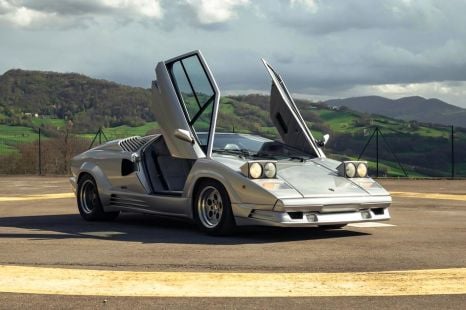

Anthony Crawford
1990 Lamborghini Countach review
6 Days Ago
A plug-in hybrid hot hatch? The Cupra Leon VZe proves that electrification doesn't have to come at the cost of driver enjoyment.
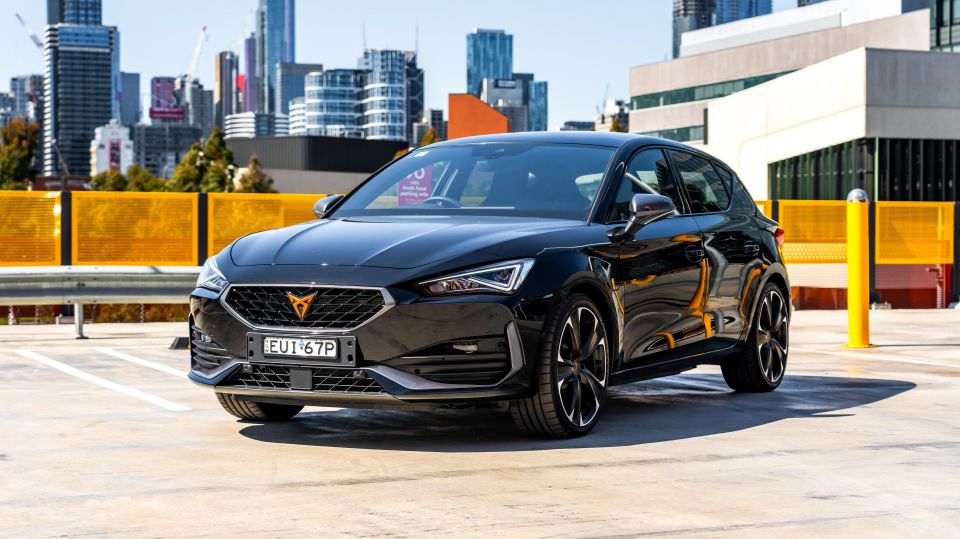
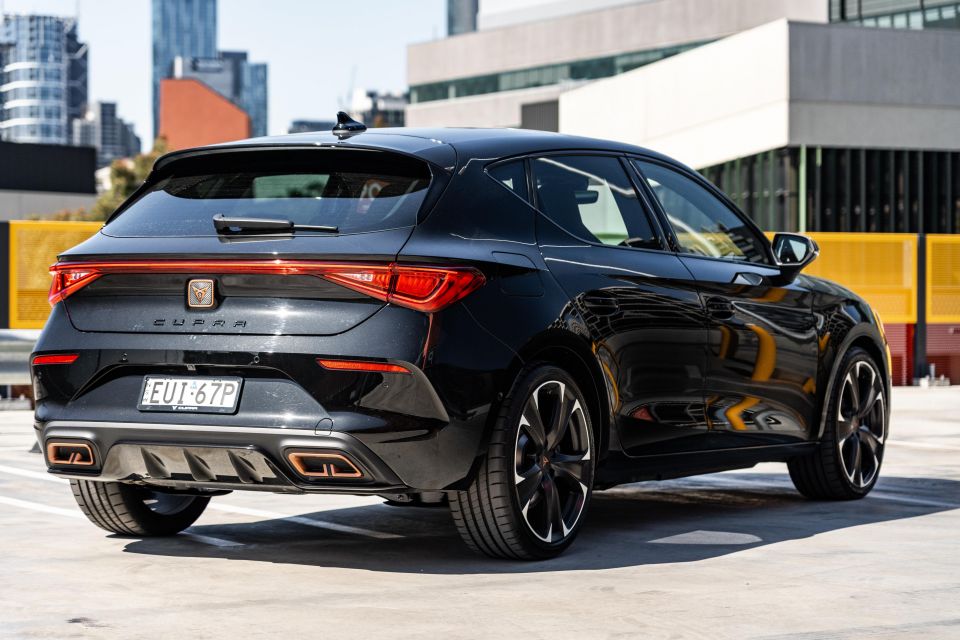

Quickly see how this car stacks up against its competition. Select any benchmark to see more details.
Where expert car reviews meet expert car buying – CarExpert gives you trusted advice, personalised service and real savings on your next new car.
As a hybrid of different cultural backgrounds myself (including Catalan), and the proud owner of a Volkswagen Golf, the Cupra Leon VZe plug-in hybrid (PHEV) sort of embodies me in an automotive form.
The Leon is an interesting vehicle. It’s based on the MQB Evo underpinnings of the Audi A3 and Mk8 Volkswagen Golf, it’s sold under both the SEAT and Cupra brands, and is produced in Martorell, Catalonia (Spain).

The VZe – or e-Hybrid as it’s known elsewhere – shares its plug-in hybrid drivetrain with the Golf GTE on the cards for a 2023 launch in Australia, pitched as a more efficient alternative to the iconic GTI hot hatch.
In Australia, it’s quite a unique car given it only comes in sporty Cupra guise, and our market doesn’t have much of a taste for PHEVs. Even its Volkswagen Group sister brands don’t offer an equivalent at this point in time.
Does the Leon VZe prove reducing emissions can still be fun? And does it justify its premium over the VZ?
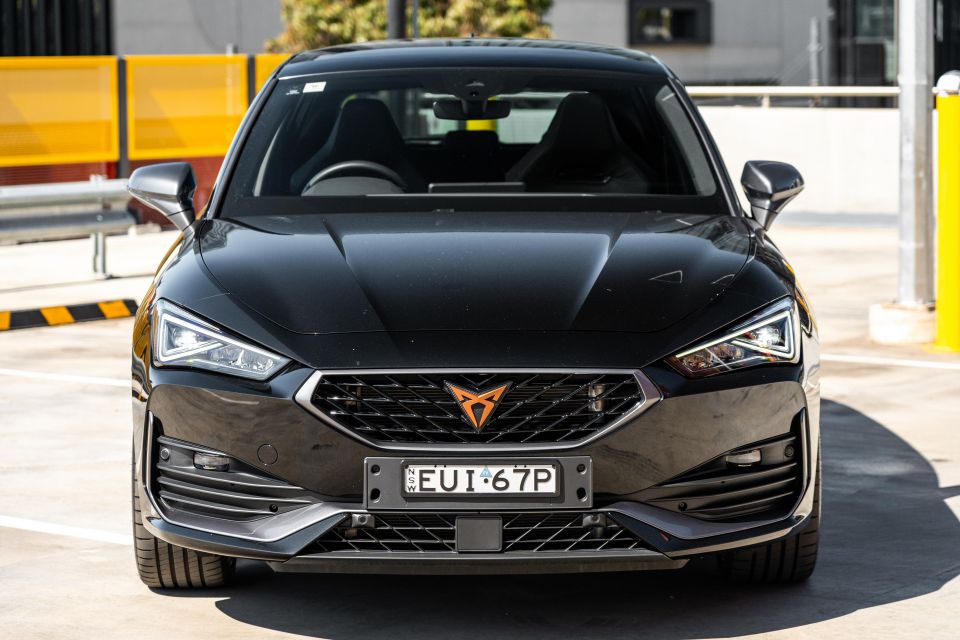
While our tester was an 2022 car, the 2023 range is now available to order with slightly adjusted pricing.
All models bar the entry-level Leon V have seen an increase of $400-500, as the 2023 cars swaps its 10-inch touchscreen for a larger 12-inch unit. Dynamic indicators have also been replaced with static ones across the range.
Priced from $60,490 plus on-road costs (see below for drive-away pricing based on State), the Leon VZe is an interesting proposition given its limited competitor set of small PHEVs in Australia. It’s $7500 more than the equivalent petrol-only Leon VZ, which is a smaller premium than we’re used to for a plug-in hybrid.
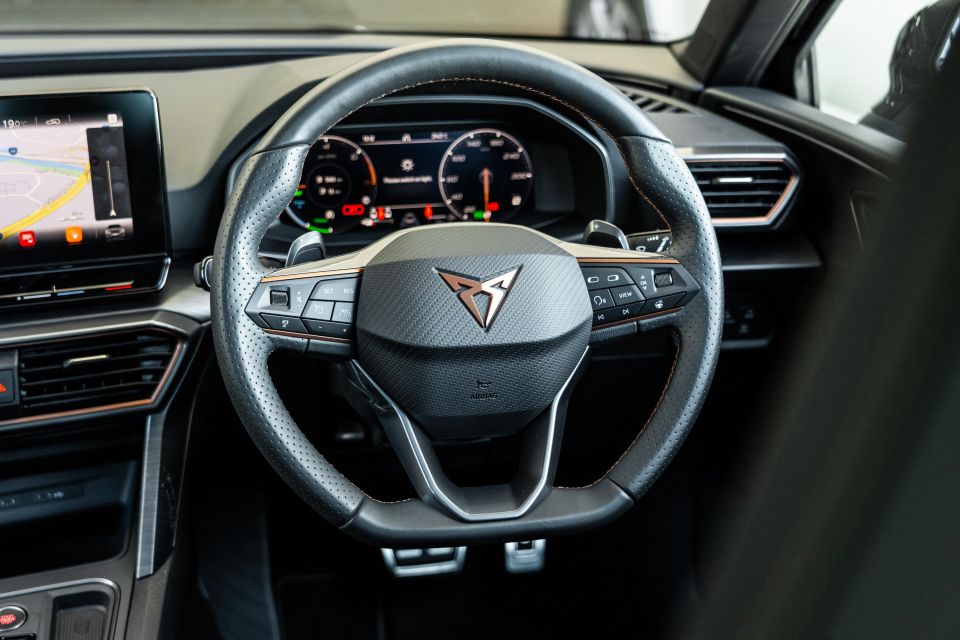
Our test car was fitted with a power sunroof ($1800). That brings the as-tested price to $62,290 before on-road costs based on MY23 specifications – quite a bit for a small hatchback.
The Mercedes-Benz A250e (160kW/450Nm) hatchback is $68,989 before on-roads, while the new Peugeot 308 GT Sport Plug-in Hybrid (165kW/360Nm) is still to be priced for our market, but it’s due in the first half of 2023 – expect it to land around the $65,000 mark.
Overseas the Leon e-Hybrid competes with the Volkswagen Golf GTE and Audi A3 40 TFSI e, as well as plug-in versions of the aforementioned Peugeot 308 and related Opel Astra. The Golf GTE has been earmarked for a late-2023 arrival in Australia, but is still to be finalised.
You could logically cross-shop the Leon VZe against the equivalent Cupra Formentor VZe, which is essentially the same car in a slightly chunkier, jacked-up crossover body. That car is only $500 more, at $60,990 plus on-roads.
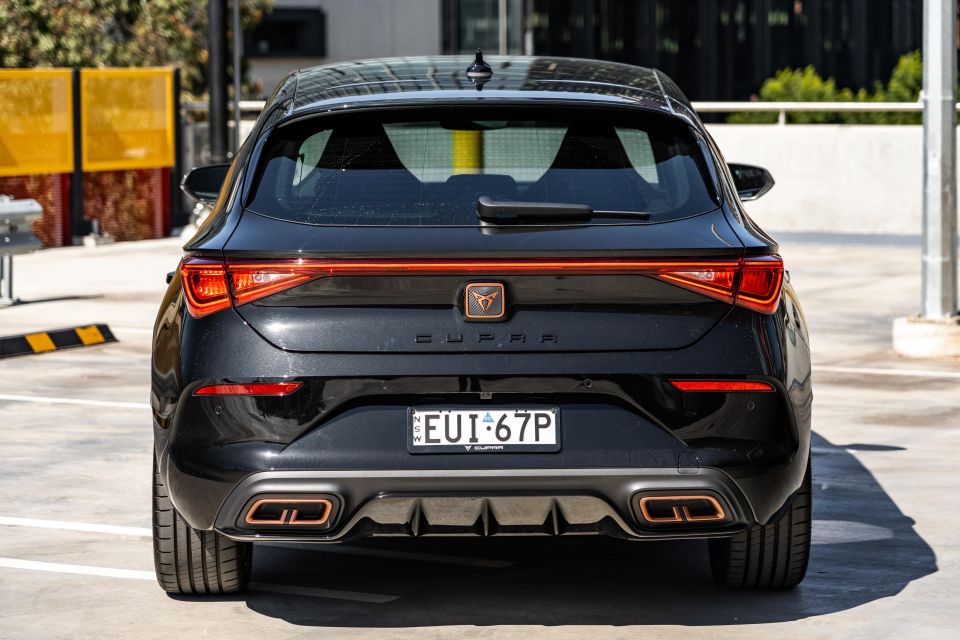
2023 Cupra Leon pricing:
Prices exclude on-road costs
Leon VZe drive-away pricing:
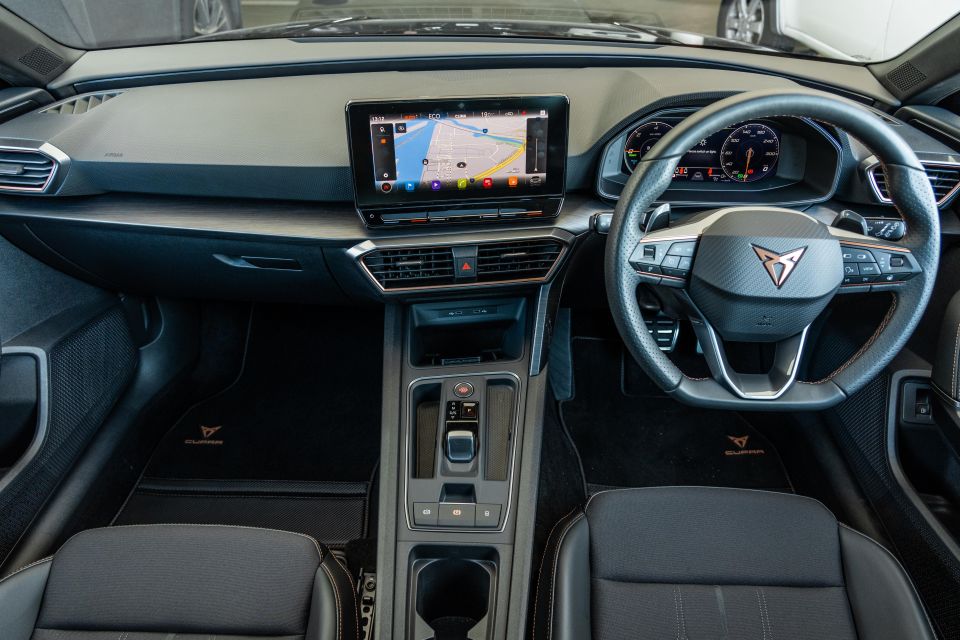
Having stepped out of the related Formentor not long ago, the Leon’s cabin is a very familiar place.
Like the latest MQB Evo-based small cars – think A3, Golf and Octavia – SEAT and Cupra’s small car cabin is quite screen-centric and takes a pared-back approach to physical switchgear. For better and for worse.
It’s uncluttered, with Cupra’s signature copper highlights adding a touch of flair that is notably absent in its platform mates. A lot of the buttons and switchgear have been lifted from Volkswagen, Skoda, and Audi, but it doesn’t come off like a parts-bin special.
Front occupants are sat in chunky, comfortable sports seats with integrated headrests, trimmed in a combination of black leather for the outer sections and supple cloth on the inserts. This is my ideal specification.
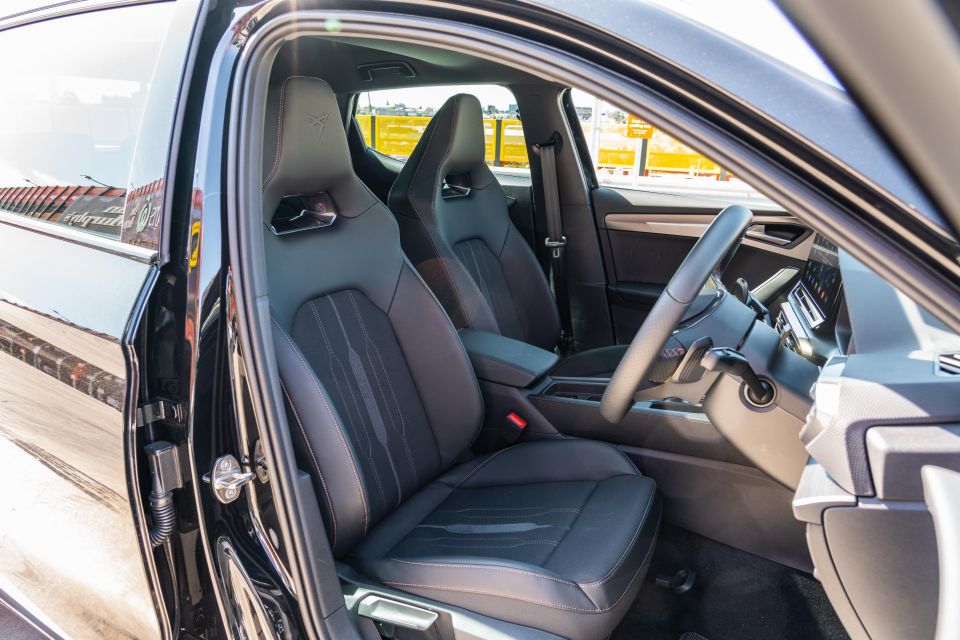
If you opt for the $2050 Leather Package in the VZe, you get full leather trim and electric driver’s seat adjustment with memory function, which also includes mirror position. It also adds heating for the front seats.
The manually-adjusted standard seats are well positioned and very comfortable. I spent plenty of time behind the wheel, including a charity drive day with Drive Against Depression which saw me cover some 250km, and at no point did I ever feel sore or unsupported.
Ahead of the driver is the ubiquitous 10.25-inch Digital Cockpit virtual instrument cluster behind a sporty perforated leather steering wheel.
Cupra does a good job of differentiating itself from Volkswagen and Skoda with its skins and layouts, offering even an Audi RS-style central tacho design and numerous options that balance new-age tech with classic layouts.
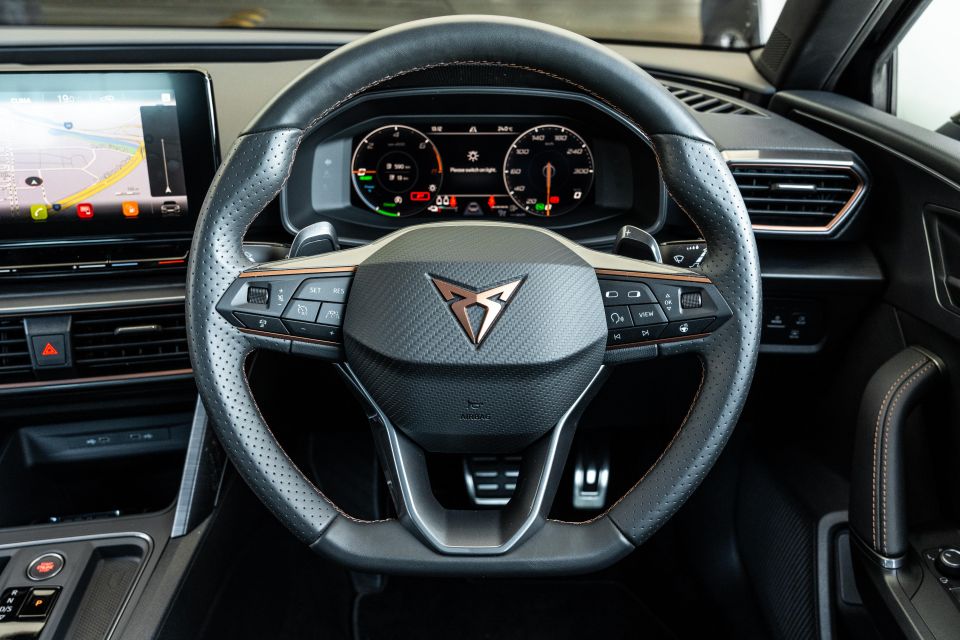
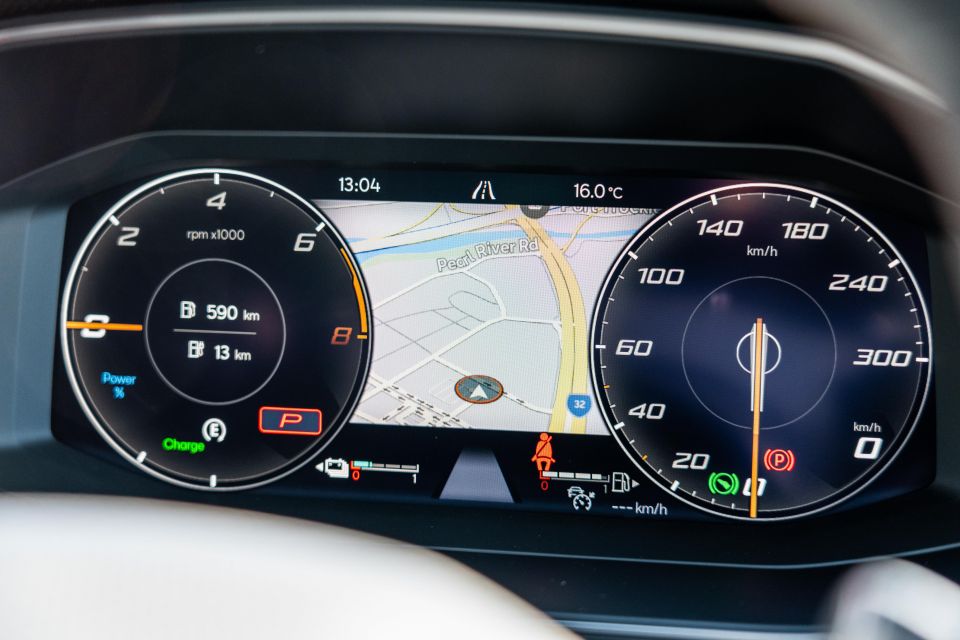
Unfortunately, the VZe misses out on the steering-mounted starter and drive mode buttons that are again lifted from the Audi R8, but the wheel design is the same. The thinner rim feels nice in the hand and is well-shaped, but I would personally prefer a smidgen more heft. The paddle shifters feel a bit plasticky, too.
One thing I noticed I haven’t seen in a lot of hybrids and plug-in hybrids, is the hybrid power meter and tachometer incorporated into one dial. Given the sporting skew of the Cupra brand, it’s quite handy seeing a rev counter and needle flicking through gears
The centre touchscreen again draws heavily upon the stuff we’ve seen in the Mk8 Golf and latest Octavia, but Cupra’s take seems a little more user friendly, even if it’s not without its quirks.
Our MY22-spec test car has a 10-inch display, but MY23 orders will upgrade to a larger 12-inch touchscreen – though the look and feel of the software will be the same.
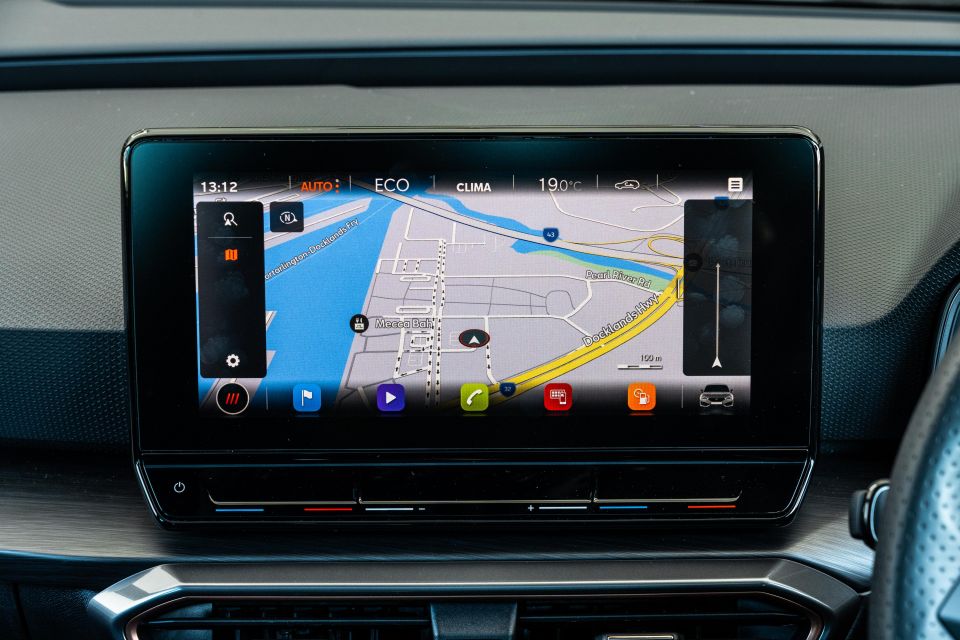
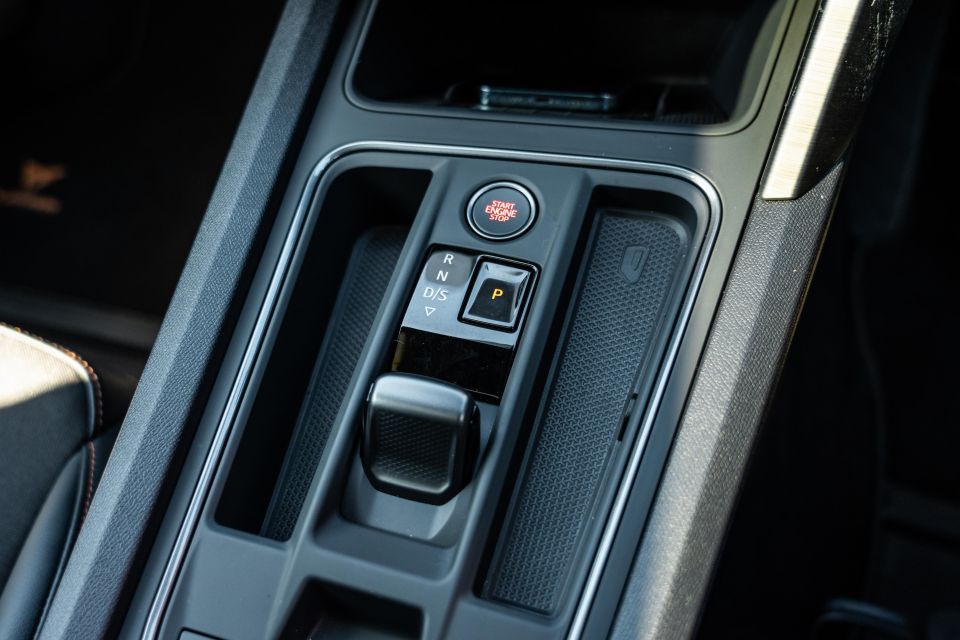
Cupra’s interface keeps a row of application tiles at the base of the screen, and there’s permanent shortcuts for the climate control system which allows you to bypass the fiddly temperature touch sliders.
Wireless Apple CarPlay worded faultlessly while we had the Leon, though the wireless phone charger didn’t always charge my iPhone 13 Pro Max – this is something I experience regularly with other brands.
Embedded satellite navigation and DAB+ digital radio all feature as well, rounding out the spec sheet nicely. Being a PHEV, the navigation will overlay a ‘range cloud’ on maps to show how far you can get with your remaining battery.
A minor frustration of mine is most key functions like drive modes, for example, are buried in the touchscreen. Climate control isn’t that big a deal if you set your preferred temperature and just leave it in auto, but having to constantly flick through menus to put the car into Sport, CUPRA, and then back into Comfort modes is a little convoluted – same goes from switching between EV and Hybrid powertrain modes.
It’s odd to me that there’s no physical drive mode selector on the centre tunnel given only the VZx gets steering-mounted controls.
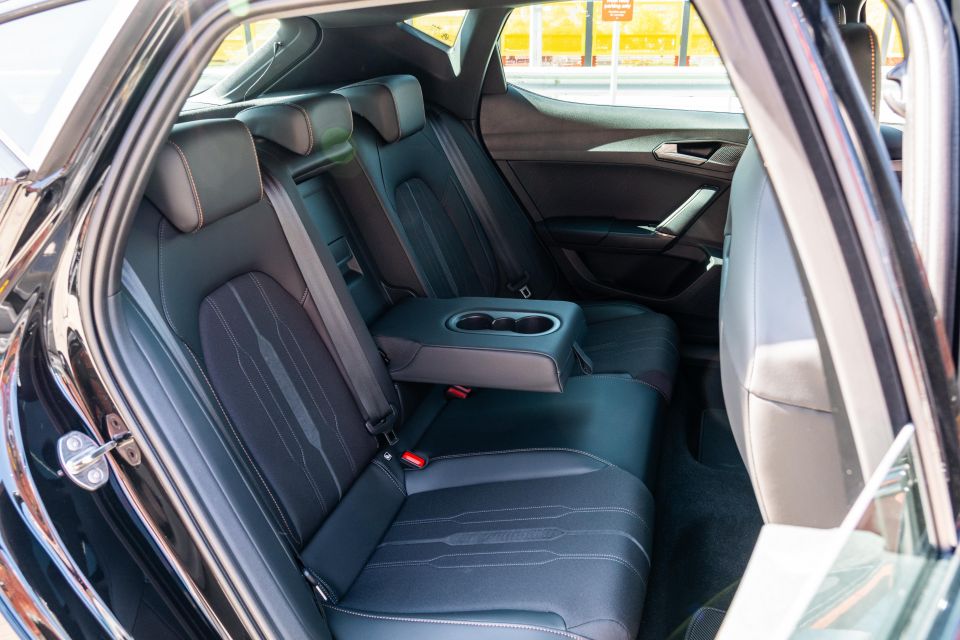
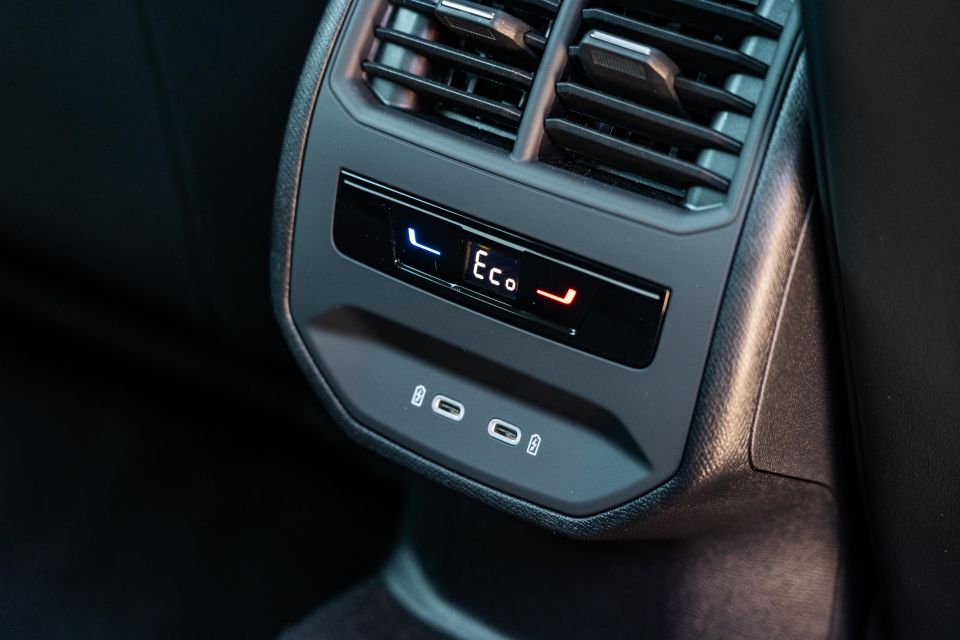
Being essentially a reskinned VW Golf, the Cupra Leon offers good rear accommodation for the small passenger class.
At just over 6’1 I can sit behind my own long-legged driving position with no fuss, making this a perfectly capable four-seater for adult passengers. A fifth person can fit in the middle, but the raised centre pew and tunnel hump make it the least comfortable position.
Amenities in the rear are also solid. There’s a third zone of climate control with directional vents, USB-C chargers behind the centre console, map pockets behind the front seats, a fold-down centre armrest with cupholders, and bottle holders in the doors.
There’s also ISOFIX anchors on the outboard positions and tether points across all three seats for the kiddies, too.
My only notable criticism of the rear seat is that the chunky front sports seats can limit forward vision for second-row passengers, so if your little ones are prone to motion sickness, this could be something to consider.
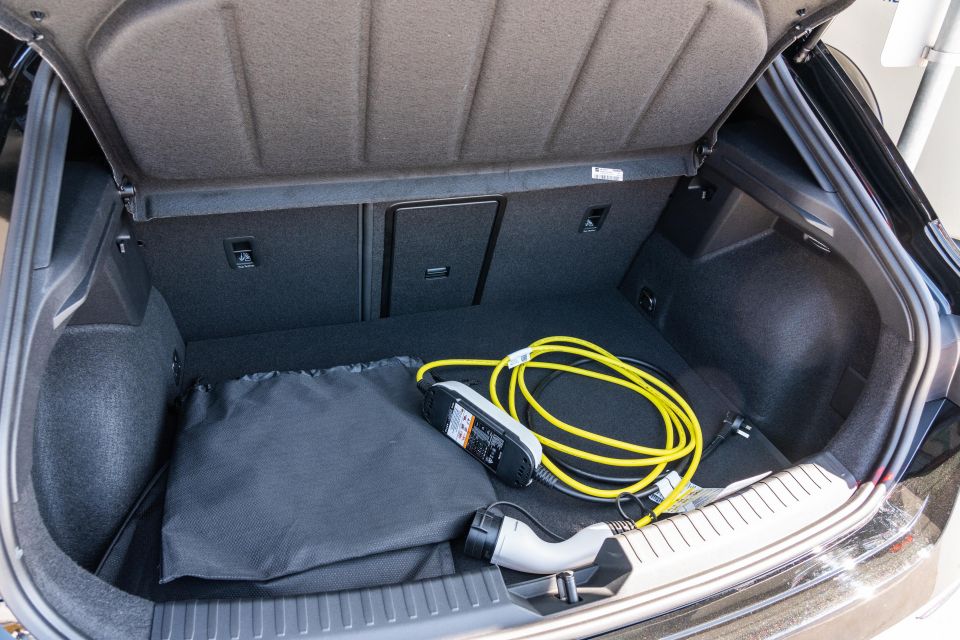
Arguably the PHEV’s biggest compromise compared to its combustion-engined equivalents is in the boot area, where it loses out on the lower portion of under-floor storage and forfeits 110 litres of capacity.
Cupra quotes just 270L with five seats in place, down from the usual 380L. With that said, the space itself is still wide and square, but it’s a shame that the environmentally-friendly option is so compromised in the boot.
There’s a ski port, however, to allow longer items to sit between the two rear passengers, and when the second row seatbacks are folded, they lie pretty flat.
Having the battery mounted under the boot floor also means you lose the space-saver spare tyre that’s standard in other Leon models, instead featuring a tyre repair kit.
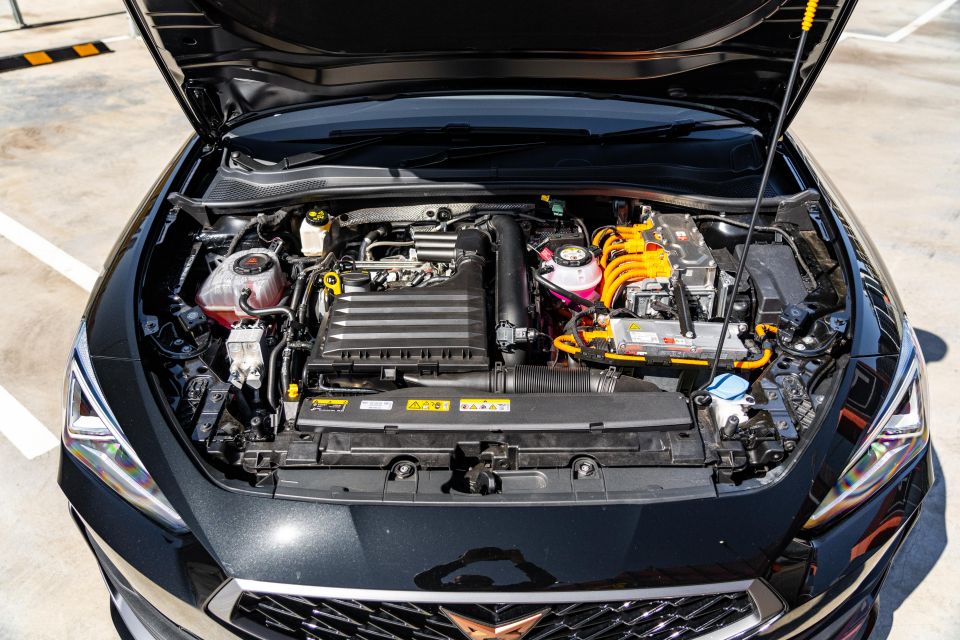
Power in VZe versions of the Leon and Formentor comes from a 1.4-litre turbocharged plug-in hybrid system that drives the front wheels via a six-speed DSG dual-clutch (wet type) automatic transmission.
The 1.4 TSI is the 110kW/250Nm unit from the Volkswagen Golf and Tiguan, and a litany of other VW Group models for that matter, paired with an 85kW electric motor and 12.8kWh lithium-ion battery pack.
System outputs are rated at 180kW and 400Nm, essentially matching that of the Leon VZ 2.0 TSI (180kW/370Nm), with 0-100 taking a claimed 6.7 seconds – 0.3 seconds off the lighter petrol-only VZ.
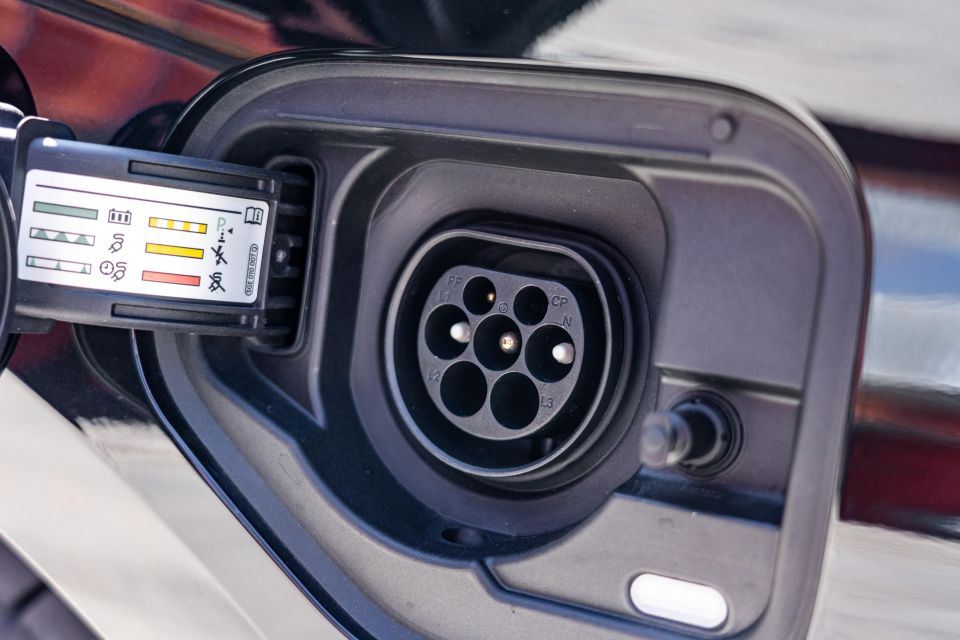
Cupra claims the Leon VZe can travel up to 67 kilometres on a full charge, with combined fuel consumption rated at a miserly 1.8L/100km and an emissions rating of 40g/km. For reference, the Leon VZ quotes 6.7L/100km and 153g/km.
The official power consumption claim is 11.3kWh/100km on the more NEDC cycle – WLTP specs stipulate 15.1-15.9kWh/100km depending on how the vehicle is optioned.
The Leon VZe has a 40 litre fuel tank compared to the 50L unit in other variants, and the drivetrain is Euro 6 certified, including a petrol particulate filter (PPF) like the wider range – something differentiating Cupra from most local Volkswagen Group models. Minimum 95 RON fuel is essential.
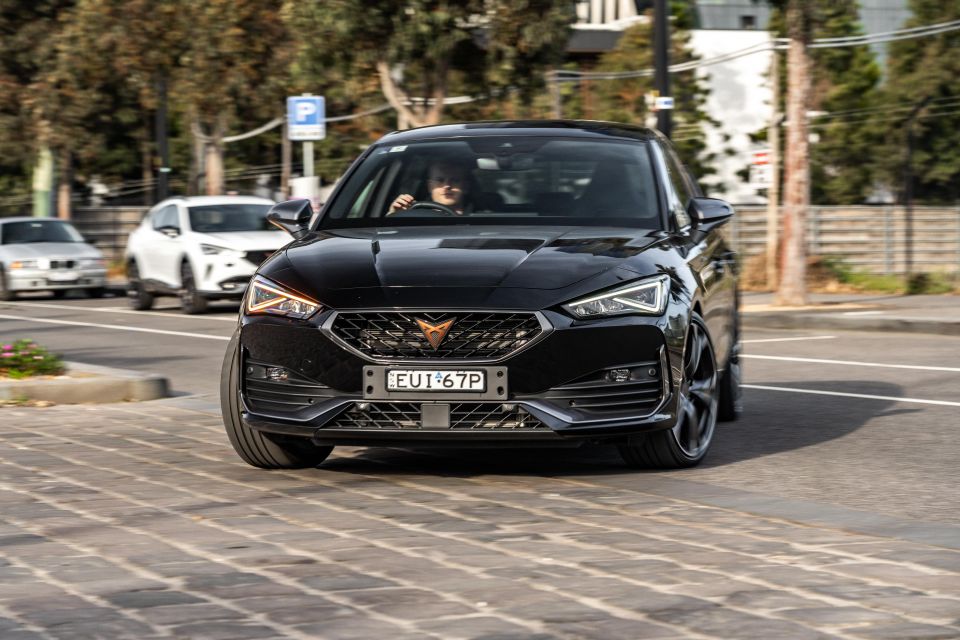
Where expert car reviews meet expert car buying – CarExpert gives you trusted advice, personalised service and real savings on your next new car.
This was my first taste of a Volkswagen Group plug-in hybrid, given the portfolio offered overseas are forbidden fruit in the Australian market.
While not everyone supports PHEV technology, I am a believer in the role this drivetrain plays as a stepping stone to full electrification, while retaining some of the soul enthusiasts are desperately trying to hold on to before we all transition to the whirring sounds of EVs.
The Leon VZe has the same 180kW as my Mk7.5 Golf GTI, as well as the new Mk8 version, and actually offers an additional 30Nm of torque (400Nm) when the PHEV system is in full attack.
While the outputs are impressive on paper, there’s a lot at play here, and the Leon PHEV has a few different sides to it depending on how you’re driving and which of its modes you’re using.
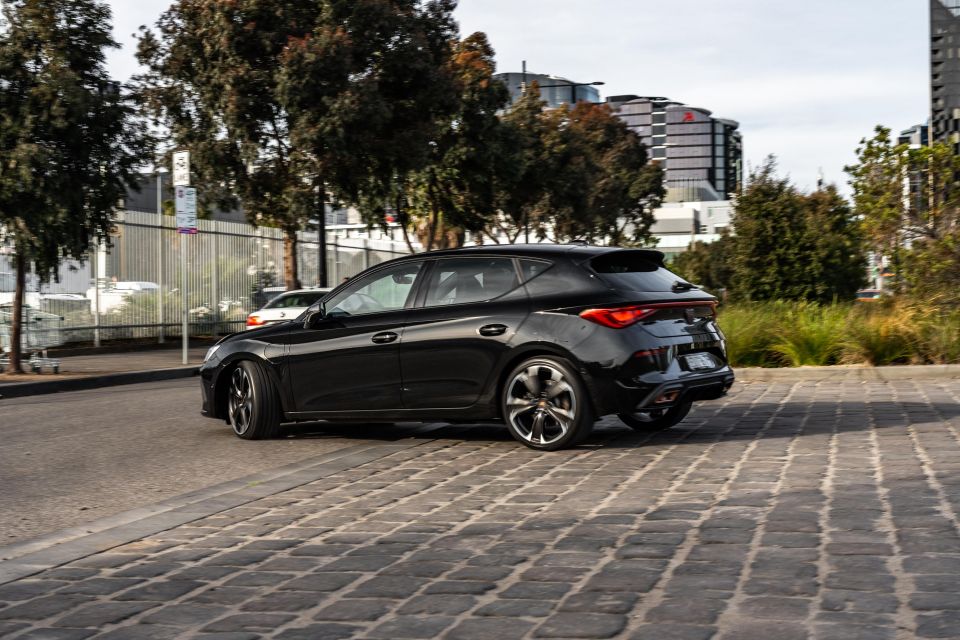
For most people, 90 per cent of this vehicle’s life will be spent commuting or doing daily errands. In these scenarios the Leon is likely to only ever operate in EV mode, provided you have enough juice in the battery and aren’t driving beyond its range claim.
On its own the e-motor, mounted between the six-speed DSG and 1.4 TSI petrol engine, makes 85kW and a healthy 330Nm – the latter on tap pretty much from the moment you touch the throttle pedal. In other words, the Leon PHEV in electric mode has similar punch to what you’d expect from an entry-level Euro diesel, minus the noise.
While it never feels particularly fast when in EV mode, the VZe is responsive off the line and is perfectly capable of getting up to freeway speeds without needing the assistance of the petrol engine. Occasionally you’ll feel the dual-clutch auto shift through cogs as you get going, but it’s anything but unrefined or jarring.
On start-up the Leon VZe defaults to EV mode and will prioritise Comfort mode, which in normal driving is probably best. Ride comfort even on large 18-inch wheels is impressive, and insulation from wind and road noise is likewise good, even with the absence of engine noise most of the time.
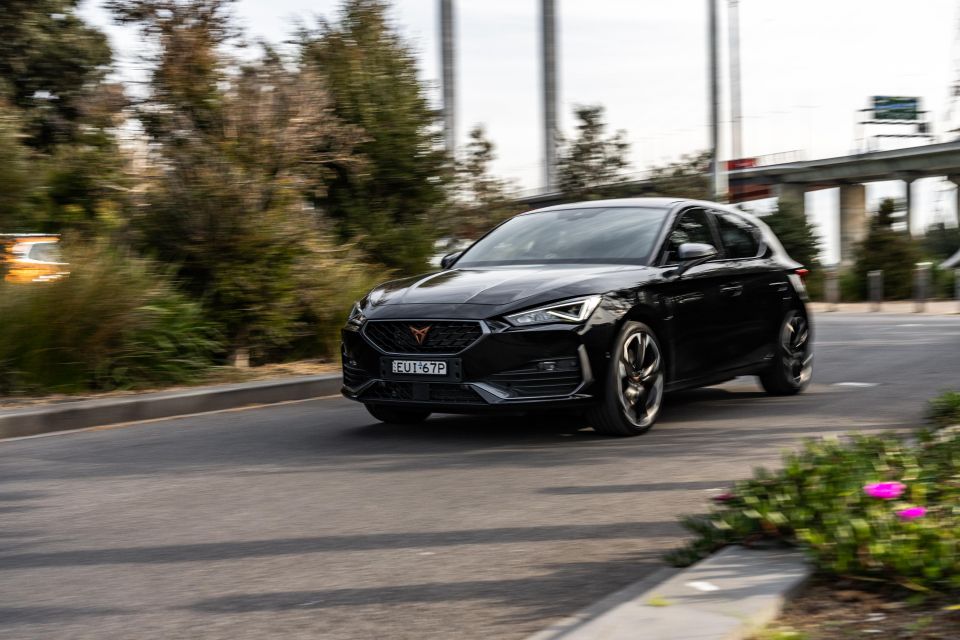
The controls are light and accurate, meaning it’s easy to pilot in everyday situations and won’t be a task to park. The beauty of having well-calibrated drive modes means you can dial things up or down as you see fit, allowing the vehicle to have something of a Jekyll and Hyde personality.
Pop it into Cupra and it firms up a bit, without being uncomfortable or overly heavy in the controls. Be more liberal with the throttle and you’ll have the 1.4 TSI petrol engine involve itself more, and when you bury your right foot it’ll light up the tachometer in blue as it engages Boost mode, offering up all 180kW and 400Nm.
It pulls hard, feeling about as quick through the seat of the pants as the brand’s 6.7-second 0-100 claim suggests, and more aggressive drive modes pump a synthesised engine noise akin to a brassy V6. While we know it’s a four-cylinder under the bonnet, the muscular lower-end and linear response right through to the top end isn’t far off the response you’d get out of a six, so I guess it works.
The engaging soundtrack and strong performance is actually quite addictive, and I tended to leave the Leon in these modes when on more spirited stints – the windy, high-speed roads on the charity drive day proved perfect for this.
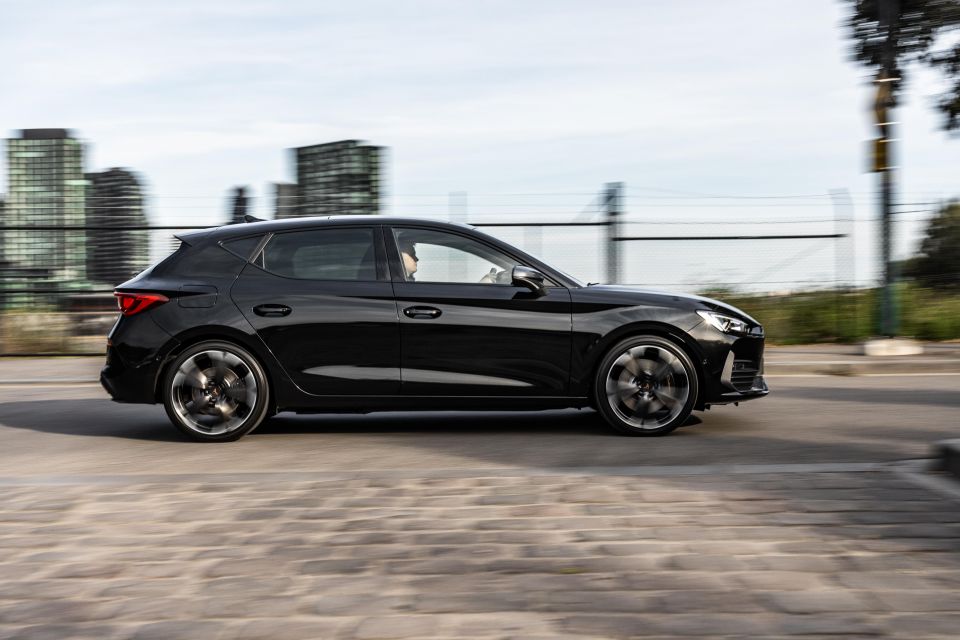
When things get twisty, the Leon VZe doesn’t feel quite as lithe and pointy as its combustion-engined stable mates, but it’s more than capable of putting a smile on your face despite its 130kg weight penalty.
As we’ve found with other MQB Evo-based products in the VW Group stable, the Cupra Leon feels nicely hunkered down and stable at all speeds, and has a keen front end that turns in nicely. There’s no mechanical limited-slip diff up front like the VZ and VZx, but there’s an electronic front diff function that vectors torque via braking.
For the most part there’s good grip, but at the limit you’ll feel the front wheels scrabble for traction as it tries to put all 400Nm to the tarmac, and if you push too hard out of a tighter corner you’ll again get a bit of slip and understeer. This is more a grand tourer than all-out corner carver.
You can also take control of gears yourself using the paddle shifters, and the Leon’s DSG does a good job at responding to inputs as you’d expect from a non-hybrid hot hatch.
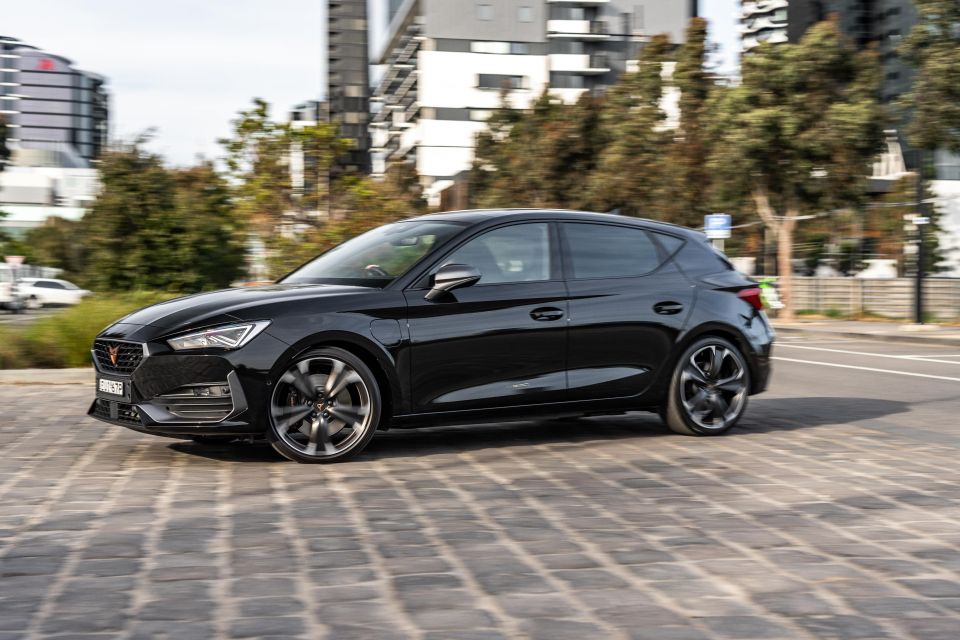
The Cupra Leon comes fitted with the usual suite of assistance features you’re used to in VW Group products, and they all operate the same way.
Travel Assist remains one of the headline acts, combining adaptive cruise and active lane-centring features to facilitate Level 2 autonomy on the highway.
It’s one of the more intuitive and accurate systems on the market, though I did notice the adaptive cruise control can be a little conservative if someone cuts into the lane ahead of you, or is travelling a few km/h lower than your set speed.
Unlike some other VW Group brands the Cupra Leon isn’t losing blind-spot monitoring and rear cross-traffic alerts for 2023, and they remain handy inclusions you don’t appreciate until you need them. The Leon’s sportback-style tailgate and thick C-pillar are somewhat negated by the tech.
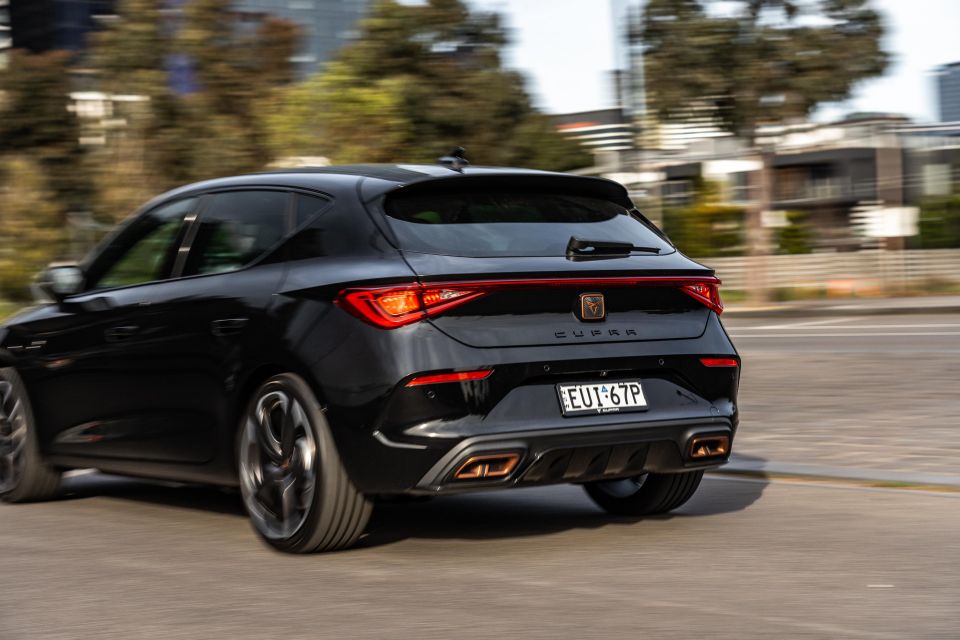
As for the battery and range, we consistently managed between 50 and 60 kilometres in mixed driving conditions, as well as colder Melbourne temperatures.
I typically drive 10km early in the morning to go to and from the gym, then my commute to the CarExpert Melbourne office is 24km each way. I’d have the battery just about to run out of EV range as I got home at the end of the day, equating to 58km of real-world EV range – about bang on the WLTP claim of 55-60km.
Once the battery runs out of usable EV range, it will default to running like a Toyota-style hybrid, using the electric motor to set off and drive under low throttle, and firing up the petrol engine once the hard work setting off is done. It’s pretty efficient when operating like this too – the trip computer showed 5.5L/100km at the conclusion of the charity drive day, over 364km and an average speed of 68km/h on mostly country highways and B-roads.
A couple of mornings I drove into the office with a depleted battery, and the Leon managed an indicated 3-4L/100km on my 24km commute, which is just as good if not better than what you’d typically achieve in a Toyota Corolla Hybrid with far less performance. Worth noting is Cupra’s European claim of 6.4L/100km (NEDC) in its charge sustaining mode – the official term for when the combustion engine is predominantly used when the battery is depleted.
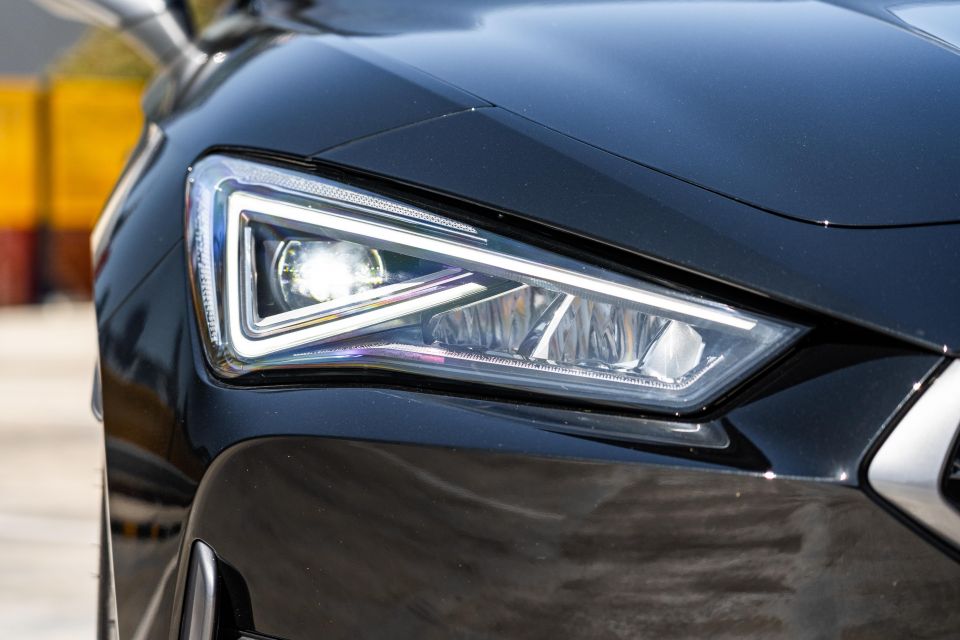

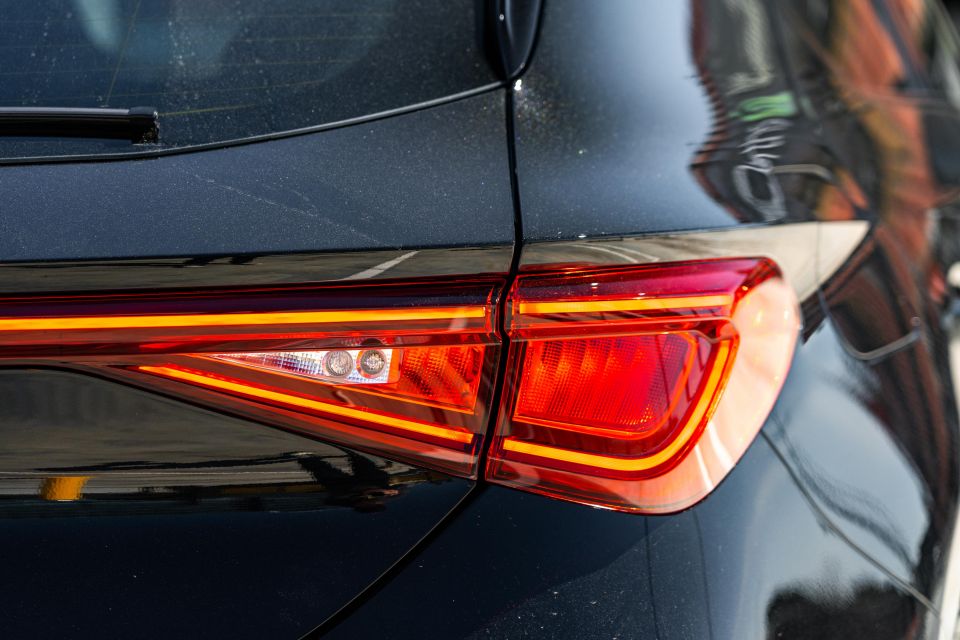
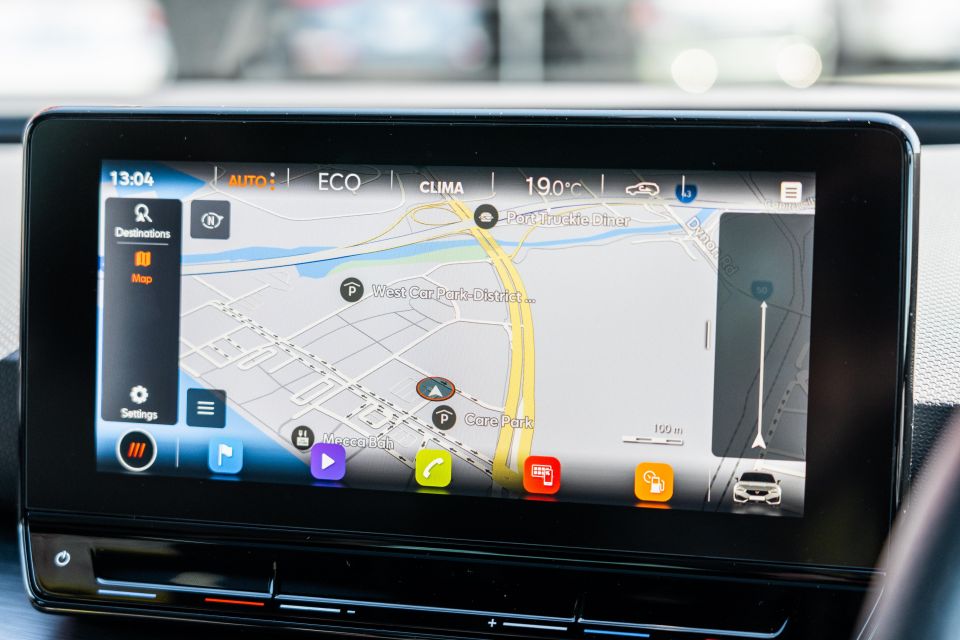
Cupra VZe highlights:
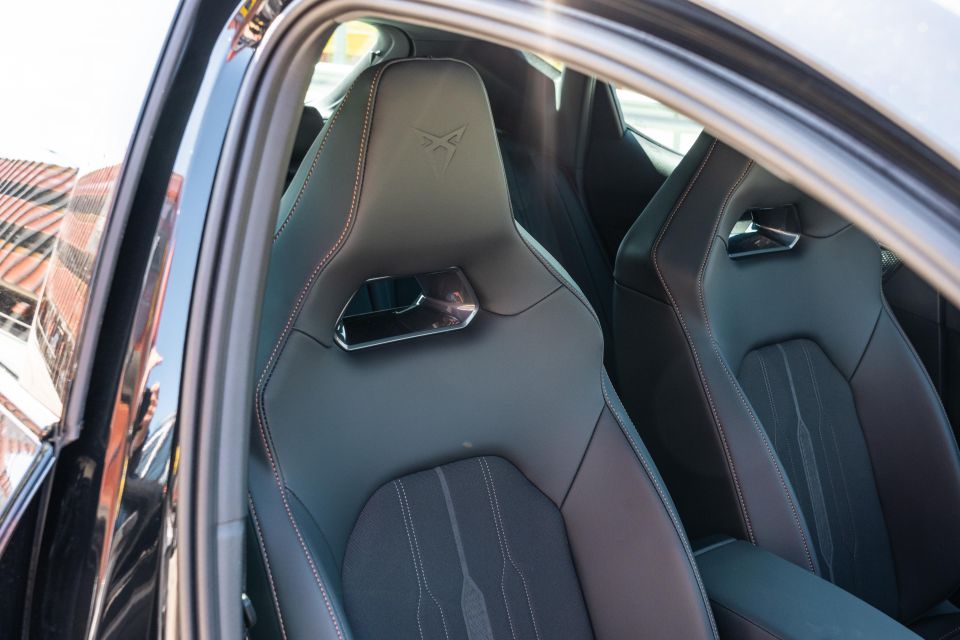
Leather Package: $2050
Electric sunroof: $1800
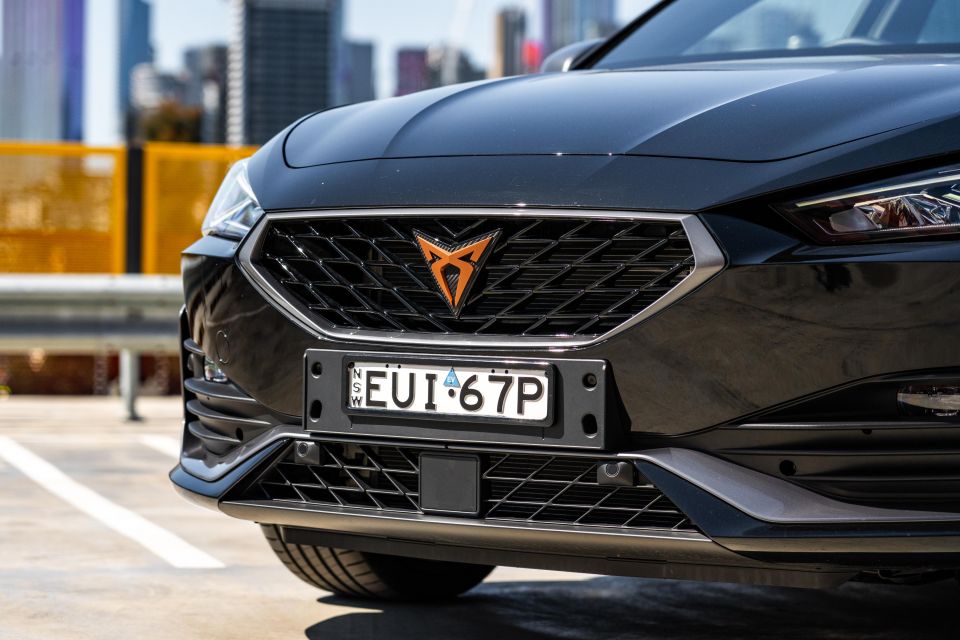
*Premium metallic finishes cost $475
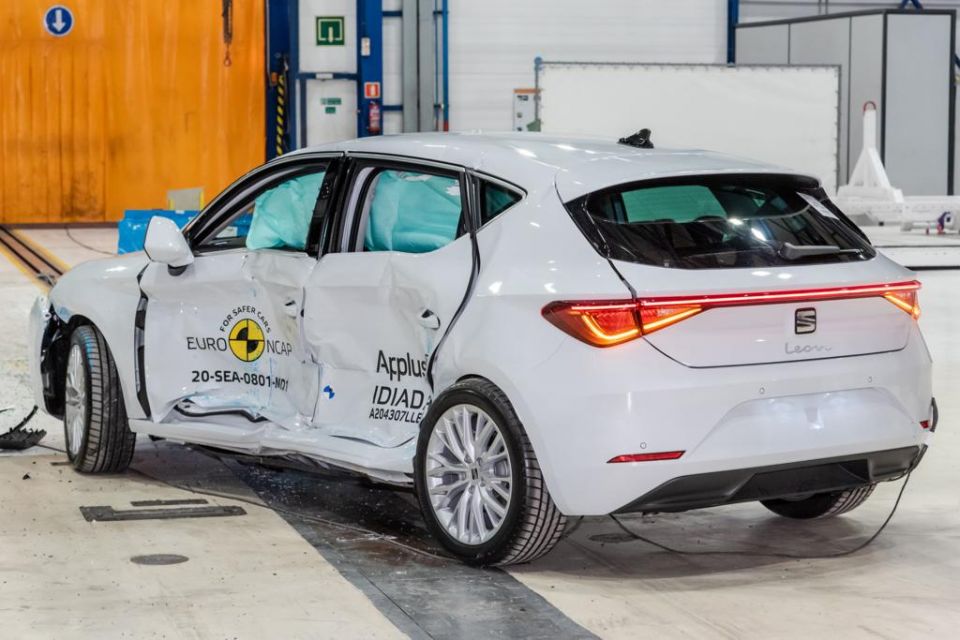
The Cupra Leon wears a five-star ANCAP safety rating, based on Euro NCAP testing conducted on the SEAT Leon in 2020.
It received an adult occupant protection rating of 91 per cent, a child occupant protection rating of 88 per cent, a vulnerable road user protection rating of 71 per cent, and a safety assist rating of 80 per cent.
Standard safety equipment includes:
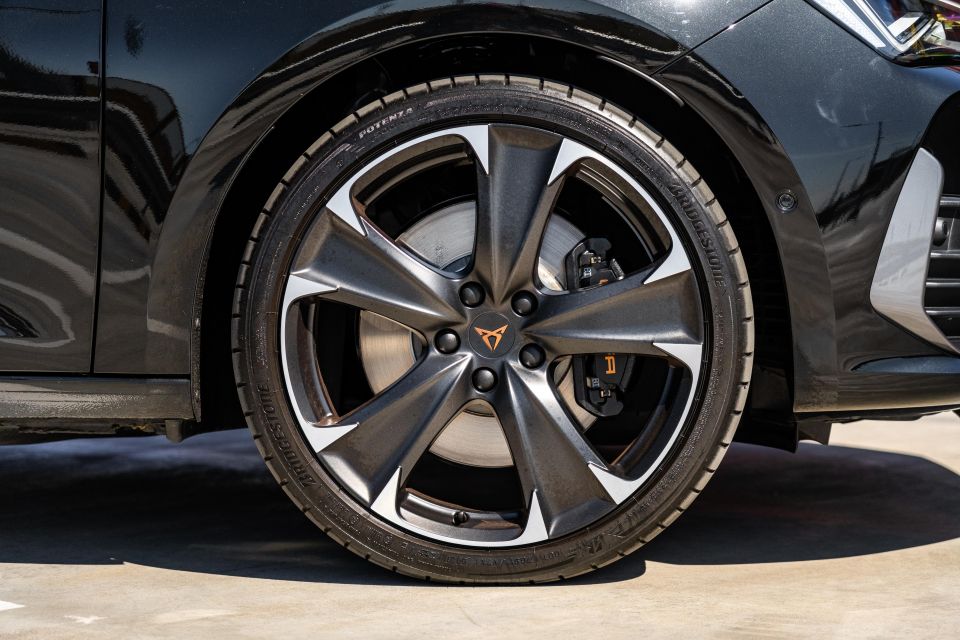
Like the wider Cupra range in Australia, the Leon is covered by a five-year, unlimited-kilometre warranty.
For models with high-voltage battery components, there’s an additional eight years or 160,000 kilometres cover against manufacturing defects or “excessive loss of net battery energy”.
Cupra also throws in three years of complementary scheduled servicing with all models, which represents a saving of around $1200-$1500 based on what Skoda and Volkswagen charge. You can add a two-year Service Pack to extend coverage to five years or 75,000 kilometres – pricing for plug-in hybrid models is $1400.
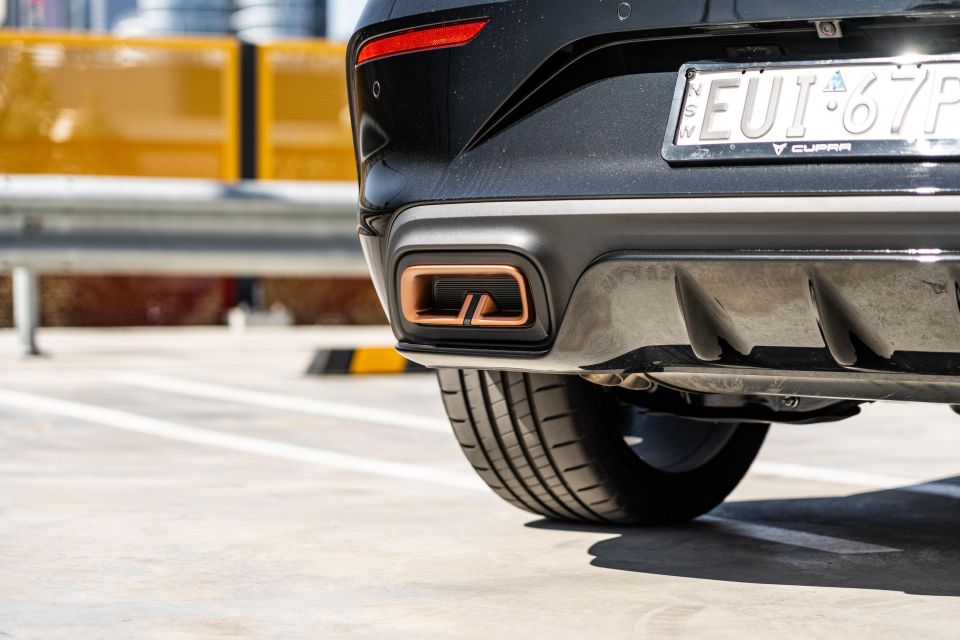
The company is currently advertising a concierge service with the purchase of a top-up pack, which covers pick-up and/or drop off of your vehicle to a nominated address provided you’re 10km from the nearest authorised Cupra Service Partner.
Following my week of testing, the Cupra’s trip computer showed an indicated average fuel consumption of 4.6L/100km over 820 kilometres. As noted earlier, this included plenty of driving on the highway and extended stints with a depleted battery – quite impressive, all things considered.
During daily duties where I started with a full battery, I easily achieved or bettered the claim of 1.8L/100km, but whether you can achieve this more or less depends on whether your average day incorporates 60km or more of driving.
Plugged in via a conventional three-point house socket, the Leon would be fully charged overnight. At 2.3kW, you can logically expect a charge time from 0 to 100 per cent in a little over six hours.
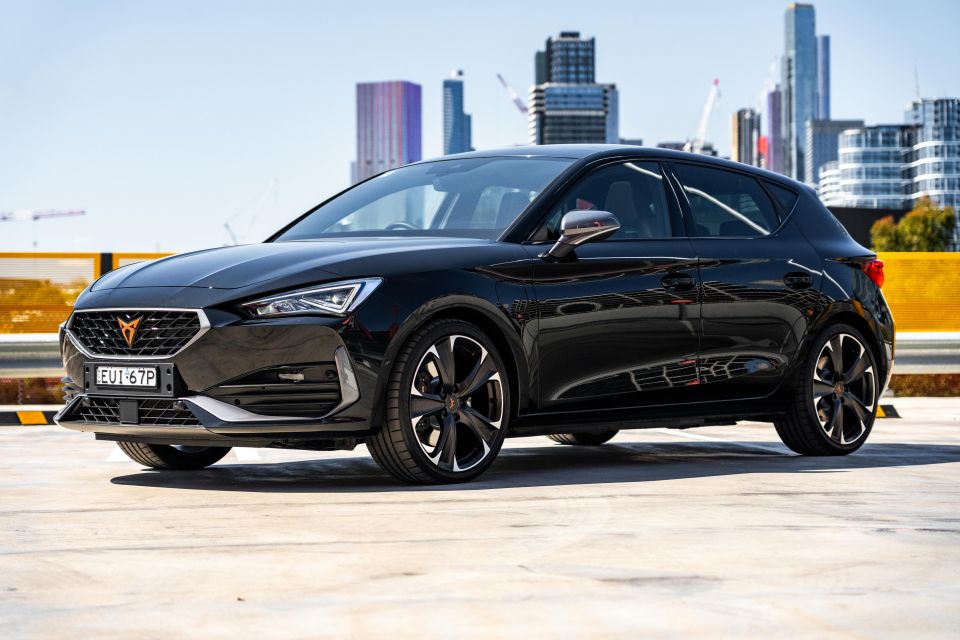
The Cupra Leon was never destined to be a top seller in SUV-hungry Australia, but the Spanish sibling to the Golf looks set to become a hidden gem.
It arguably offers a more intuitive infotainment interface, if still not perfect, and unlike its platform mates in Australia offers a high-output plug-in option that demonstrates going electrified doesn’t have to leave you cold. There’s a certain flair about how it looks and feels to drive that helps it stand out, too.
The Leon VZe may not be quite as quick or as sharp as a Golf GTI, or a Leon VZ for that matter, but for the overwhelming majority of use cases it’ll be significantly more efficient while offering competitive performance and handling.

Cupra’s $7500 charge for PHEV tech is more affordable than most other brands, though some may still find it too steep, especially when the VZ offers all the same kit and brisker performance for less coin.
Further, while the Leon PHEV is scant on direct competition Down Under, its Formentor VZe sibling at just $500 more presents as more metal for the money, though is slightly slower and offers less EV range.
Like most plug-in hybrids, the Leon VZe caters to a very specific audience. If you fall under that category like I do, it could be the perfect fit.
Click the images for the full gallery, and for more info about Drive Against Depression click here
MORE: Everything Cupra Leon
Where expert car reviews meet expert car buying – CarExpert gives you trusted advice, personalised service and real savings on your next new car.
James is an automotive journalist based in Melbourne, Australia. Before joining CarExpert.com.au in 2020, James has worked at leading auto media outlets including Carsales and CarAdvice, as well as at Pulse agency for Ford Australia's communications team. In 2019 James made Mumbrella's 'Top 20 most prolific web authors in Australia' list after publishing 1,360 articles between March 1, 2018 and February 28, 2019 for CarAdvice. James is also an Ambassador for Drive Against Depression – an Australian charity whose mission is to support mental wellness through the freedom of driving and a shared love of cars.


Anthony Crawford
6 Days Ago


Matt Campbell
5 Days Ago


James Wong
4 Days Ago


Max Davies
2 Days Ago
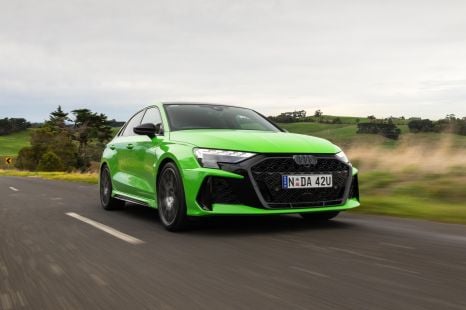

Josh Nevett
1 Day Ago
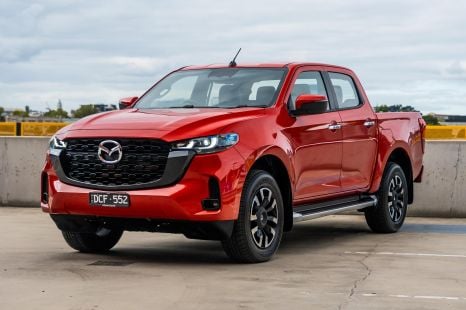

Josh Nevett
21 Hours Ago